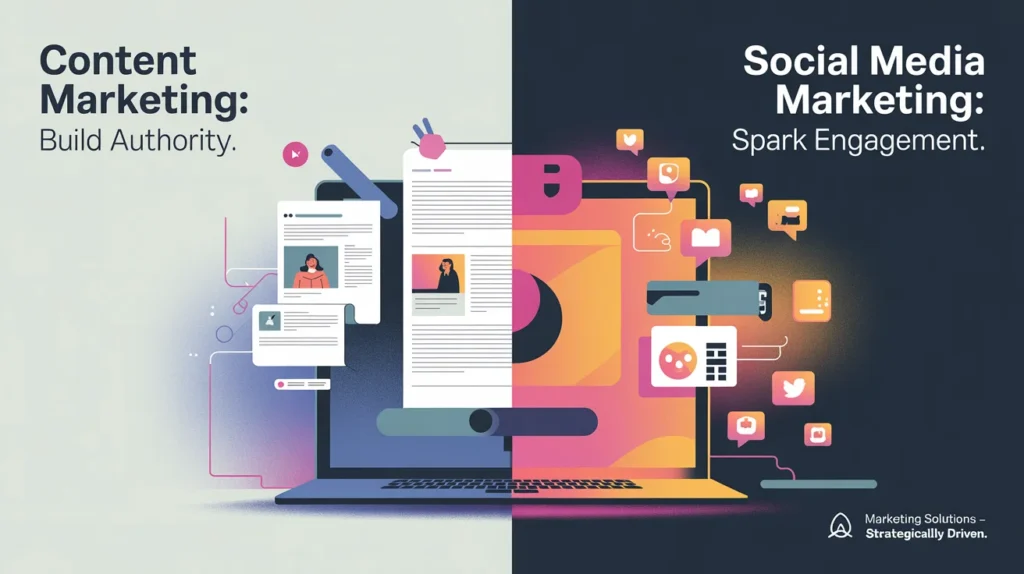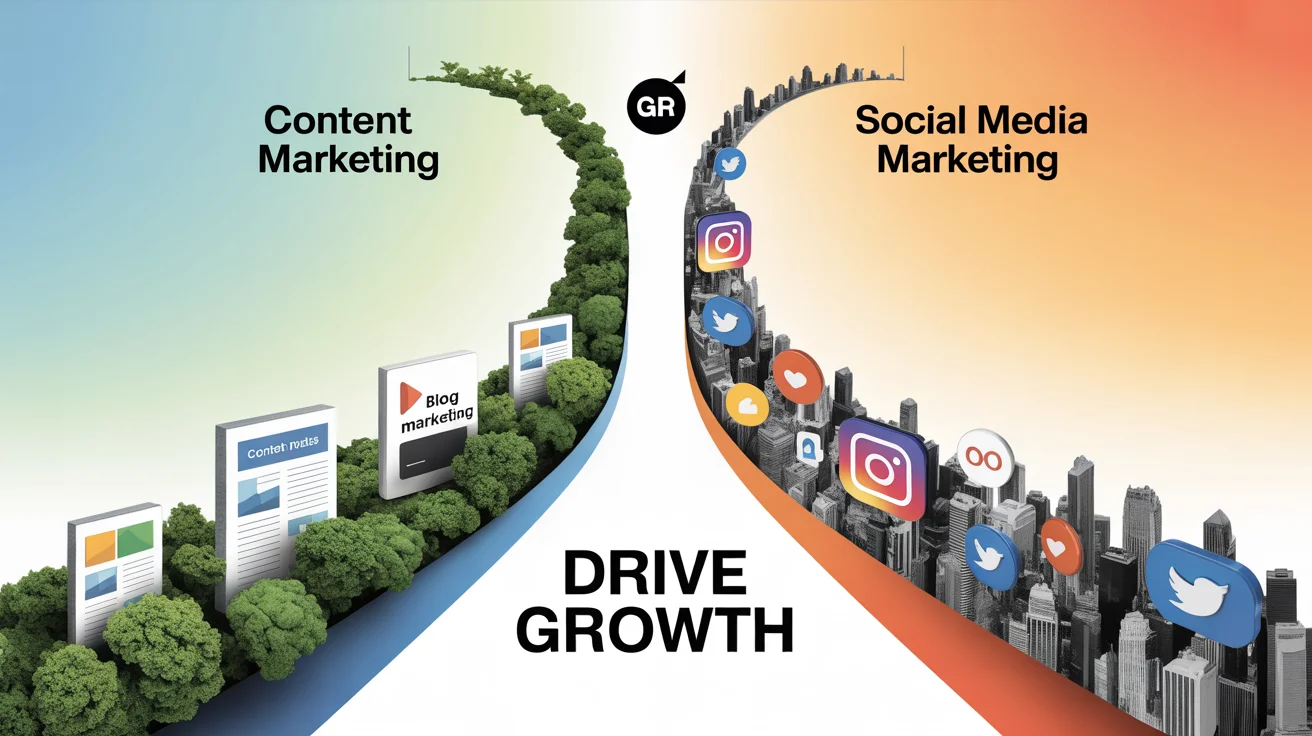In today’s digital landscape, businesses often face the challenge of choosing the right strategy to connect with their target audience. One of the most debated topics is content marketing vs social media marketing.
Both methods are essential for a comprehensive marketing plan, yet each serves different purposes and delivers different results.
In this article, we will explore the key differences between these two strategies, examining their strengths, challenges, and how they can complement each other for a successful digital marketing campaign.
What is Content Marketing?
Content marketing is a strategy focused on creating and distributing valuable, relevant, and consistent content to attract and engage a specific audience.
The goal is not to sell directly but to build trust, educate, and inform potential customers, thereby influencing their purchasing decisions in the long term.
Content marketing typically includes blogs, articles, eBooks, case studies, videos, podcasts, white papers, and more.
It can be shared on various platforms, including websites, emails, and blogs, and it provides information that resonates with the audience’s needs and interests.
Key Characteristics of Content Marketing:
- Focuses on creating long-term relationships with customers.
- Aims to educate, inform, and provide value.
- Primarily used for lead generation and brand building.
- Often provides in-depth content that addresses specific customer pain points.
What is Social Media Marketing?

Social media marketing involves using social media platforms like Facebook, Instagram, Twitter, and LinkedIn to promote a brand, product, or service.
The primary focus is engagement, building brand awareness, and creating conversations with followers.
Unlike content marketing, which focuses more on valuable information, social media marketing relies heavily on quick, eye-catching content that resonates with audiences instantly.
Through social media, brands can post updates, images, videos, polls, stories, and ads, making it a more dynamic platform for real-time engagement with followers.
Key Characteristics of Social Media Marketing:
- Focuses on real-time engagement and interaction.
- Shorter, snappier content aimed at catching attention.
- Primarily used to increase brand awareness and social engagement.
- Leverages paid ads, stories, and promotions to reach a wider audience.
Content Marketing vs Social Media Marketing: Core Differences
While content and social media marketing may seem similar, their objectives, content delivery methods, and long-term goals differ.
Content Creation and Delivery
Content marketing generally involves creating high-quality, informative, and evergreen content. This content is distributed through blogs, websites, and email newsletters, providing detailed information on interesting topics. Search engines often index this content, giving it long-term visibility.
Conversely, social media marketing focuses on creating short, engaging posts that grab attention immediately. These posts are typically designed to evoke emotions, drive traffic to a website, or spark conversation, but do not necessarily provide in-depth content.
Engagement and Interaction
Content marketing requires a more passive form of engagement, as users consume content at their own pace. It’s about providing value that users can reference when needed. Social media marketing, however, thrives on real-time engagement, where businesses can interact directly with their audience through comments, likes, shares, and messages.
Long-Term vs. Short-Term Goals
Content marketing usually focuses on long-term goals, such as building trust and authority over time. It aims to provide consistent value that nurtures leads and builds relationships.
In contrast, social media marketing often has more immediate, short-term objectives. It aims to capture attention quickly, promote timely offers, and drive immediate actions like clicks, shares, or purchases.
SEO and Organic Reach
SEO practices heavily influence content marketing. The more valuable and relevant content you create, the higher the chances of ranking on search engines like Google, bringing organic traffic to your website. This is why content marketing has long-term benefits.
Although social media marketing can drive traffic and engagement, it does not directly affect your website’s SEO rankings. Search engines like blog posts do not index social media posts. However, social media marketing can drive significant traffic when strategically integrated with your website content.
When to Use Content Marketing vs Social Media Marketing
1. Use Content Marketing When:
- You want to build long-term brand authority and trust.
- Your goal is to educate and inform your audience.
- You need content that can rank on search engines for better organic visibility.
- You aim to create in-depth, detailed content that addresses specific problems or pain points.
- You have a well-established website where you can house blogs, videos, and articles.
2. Use Social Media Marketing When:
- You want to engage directly with your audience in real-time.
- Your goal is to create buzz or increase brand awareness quickly.
- You need to promote timely events, products, or promotions.
- You aim to reach a broad audience through paid ads and sponsored posts.
- You want to create interactive and fun content like polls, stories, or quizzes.
How Content Marketing and Social Media Marketing Work Together
While content and social media marketing may have distinct purposes, they can be incredibly effective when used together. Here’s how they complement each other:
- Content Marketing Fuels Social Media: High-quality blog posts, videos, and other content can be shared across your social media channels, giving your social followers easy access to valuable resources.
- Social Media Drives Traffic to Content: Social media marketing drives traffic to your website, where your in-depth content lives. By sharing links to blogs, white papers, or videos, you can attract visitors interested in learning more.
- Cross-Promotion Opportunities: Engaging social media posts can spark discussions and generate curiosity around your content, while detailed content can drive deeper engagement when shared on social media.
Advantages of Content Marketing and Social Media Marketing
Content Marketing:
- Builds trust and authority over time.
- Helps generate organic traffic through SEO.
- Provides long-term value for customers.
Social Media Marketing:
- Provides instant engagement with the audience.
- Increases brand visibility and awareness quickly.
- Effective for promoting timely offers and promotions.
Challenges of Content Marketing and Social Media Marketing
Content Marketing:
- Requires a lot of time and effort to produce high-quality content.
- Needs to be updated regularly to remain relevant.
- It can be challenging to measure immediate success.
Social Media Marketing:
- Content can be easily forgotten if not continuously engaging.
- Organic reach has been decreasing, requiring more investment in ads.
- The short-lived nature of social media posts makes it challenging to have a long-term impact.
Conclusion:
In conclusion, content and social media marketing have distinct advantages and challenges. The key to an effective digital marketing strategy is to use both methods.
Businesses can build long-term trust and engage with their audience in real time by creating high-quality, valuable content and promoting it through social media platforms.
By understanding the strengths of each approach, businesses can create a balanced strategy that maximizes engagement, boosts brand visibility, and ultimately drives long-term growth.
Frequently Asked Questions:
1. Which is better, content marketing or social media marketing?
Both are important. Content marketing builds long-term value, while social media marketing provides immediate engagement. Combining both is the most effective approach.
2. Can content marketing help with SEO?
Yes, content marketing plays a crucial role in SEO. It helps your website rank higher on search engines through valuable, relevant content.
3. How can I measure the success of content marketing?
Success can be measured through metrics such as website traffic, time spent on page, leads generated, and conversions.
4. Is social media marketing worth the investment?
social media marketing helps increase brand awareness, engage directly with customers, and drive immediate sales.



